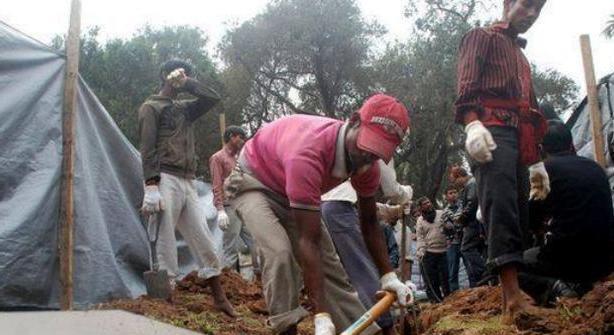Text/Gibb
In other words, during World War II, how tragic the war situation around the world was, I believe that many friends who are familiar with reading this history have some understanding.
No matter which country, in this tragedy has lost a lot of resources and manpower, and after the war, it will take a lot of time to restore the vitality of the country, so a world-class war is enough to change the pattern of the entire world.
Of course, the worst is the civilians who were affected and the soldiers who died, who came from all over the world but died in war, some of whom could not even bring their ashes back to their homeland, and even more could not find their bones.

Below, I will briefly tell you the story of the Japanese searching for the bones of soldiers after the war. This incident is indeed a sin of their own making, and if they had not started a war, how could they have suffered such a large number of casualties?
After the war, according to Japanese statistics, more than 2.4 million of them died overseas, and later after a long period of searching for bones by their descendants, more than a million people's bones were not recovered, and many of them were difficult to trace.
According to Japanese culture, we know that they attach great importance to the remains of soldiers who died in battle, and many old photos have recorded that many surviving soldiers hold the urns of soldiers who died in battle on their chests and transport them back to China for burial after the war is over.
Unfortunately, in the later stages of World War II, most of the Japanese troops were defeated, and almost no one could bring the bones back to the mainland, so many corpses had to be abandoned and disappeared with the passage of time, and the difficulty of more than a million bones wanted to take them back is self-evident.
Of course, after the war, the Japanese authorities are still very supportive of the work of recovering the bones of fallen soldiers, and even, they do not hesitate to spend huge sums of money to find them overseas, as long as they get the news of the bones, the authorities will inevitably come forward to communicate with the relevant local departments at the first time, preferring to spend a high price and want to redeem the bones for burial.
To say that such a large project, it is certainly not enough to rely on the Japanese authorities alone, so many Japanese people have also spontaneously joined the ranks of "bone pickers", a large part of these people are the remains or descendants of Japanese soldiers who died in World War II, and the number is very large.
Moreover, the authorities will give them some subsidies, they spend hundreds of millions of yen every year to search for bones outside, as long as there is news, no matter which country overseas, they will hear about it, and even risk going to some small islands to find.
For example, in the Solomon Islands, there is a place named "Guadalcanal", which was the most taboo place for Japanese soldiers during World War II.
Because the climate and environment of this island are very bad, coupled with the logistics supply line was cut off by the Allies, the soldiers here even the most basic food and drink has become a big problem, at that time, more than 20,000 Japanese soldiers died here, most of them starved to death because they could not eat.
Therefore, to this day, many Japanese overseas "bone pickers" are still searching for the bones of soldiers killed in World War II on Guadalcanal. According to rough statistics, nearly 7,000 bones are still scattered in the dense forest of the island, and the harsh natural environment is not generally difficult for the search work.
For this reason, the bone picker will invest more time and money. Of course, this is not the place where such a bad place is, and there are many such places overseas.
Decades after the end of World War II, Japanese "bone pickers" recovered a total of 1.27 million bones, the vast majority of which were found in China, Myanmar and other countries, and more than half of the bones were scattered around the world.
With the continuous passage of time, as well as natural and human intervention, the "bone pickers" want to retrieve the bones that have not yet been found, the difficulty is not general, even if no matter how much money and scientific and technological strength is invested, it may not be able to achieve significant results. However, for these Japanese "bone pickers", their stubbornness is still there, and the action is still continuing.
Finally, through this incident, we can know how much disaster the Second World War brought to all mankind, and countless soldiers were exiled overseas and died in other places.
Of course, where there is war, there must be death, and this is an eternal law of nature. But then again, if Japan had not taken the initiative to launch this damn war, perhaps many countries would not have suffered such heavy casualties. I don't know if the Japanese people now regret it?
References for this article: "The Complete History of World War II", "The Complete Record of the War of Resistance Against Japanese Aggression in China 1931-1945", "Baidu Encyclopedia Related Terms - World War II, Japan's "Bone Picker", Post-War Japan, etc.